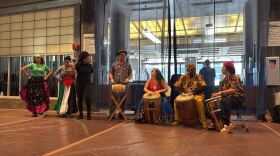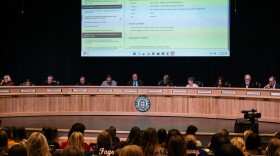This story was originally published by CalMatters. Sign up for their newsletters.
A scholarship for Black students at UC San Diego is now available to anyone, regardless of race, after students and a right-leaning nonprofit organization sued the university for discrimination this July.
The plaintiffs argued that the scholarship fund violated a series of laws, including the Ku Klux Klan Act of 1871, which was put in place to protect Black Americans in the South.
One of the students, Kai Peters, said he was denied access to the scholarship because he isn’t Black. Peters sent a written statement to CalMatters through the Californians for Equal Rights Foundation, the nonprofit plaintiff. He said his lack of access is an example of “institutionalized racism” — a phrase that was created in part to characterize how government institutions discriminate against Black Americans.
“I don’t see the irony,” said Joshua Thompson, an attorney for the Pacific Legal Foundation, which represented the plaintiffs. “The idea is that we don’t want government actors out forcing their discrimination.”
The Black Alumni Scholarship Fund for UC San Diego students is now called the Goins Alumni Scholarship Fund, named after its founding donor Lennon Goins, according to a press release last week. Its website says each scholarship is worth $2,500 and that nearly 275 scholarships have been awarded since 2016.
The rebranded scholarship program is just one of numerous initiatives in California that have come under scrutiny in the last two years. In 2023, the Supreme Court overturned precedent that allowed private universities in the state to use affirmative action, and this year, the Trump Administration has ended numerous campus initiatives promoting diversity.
In March, the UC changed its hiring practices, banning its 10 campuses from requiring “diversity statements” as a condition for employment. Now those statements are voluntary.
Other changes are more subtle. In February, Bakersfield College described its “Chicano/Latino Pre-Commencement Event” as a means to “encourage Chicano/Latino students to participate in (graduation) celebrations.” But by the time graduation rolled around in May, the word “Chicano/Latino” had been removed from that sentence.
Website indicates change of focus
The press release about the Black Alumni Scholarship Fund didn’t address the reason for the change, and a spokesperson for the San Diego Foundation, Hiram Soto, declined to comment further.
But a CalMatters analysis of the fund’s website shows how the university changed course.
In September, the website said that the university scholarship fund was founded in 1983 by Goins to “expand educational opportunities for high achieving, civic-minded African American students,” focusing on admitted Black students with a record of “community service” and “resiliency to racial and other identity challenges.”
There was no mistake that this fund was by and for the Black community. “100% of BASF Scholars identify as Black/African American,” the website said, adding that the goal of the scholarship fund was to “increase Black graduation at UCSD from 2% to 5% of degrees awarded.”
Despite decades of scholarships, that goal remains unattained. In the 2023-24 school year, just under 3% of UC San Diego’s undergraduate degrees awarded went to students who identify as Black or African-American, according to the system’s data.
Racial discrimination is illegal in the U.S., but in California, the standard of what constitutes discrimination depends in part on whether an entity is public or private. While private entities, including nonprofits and foundations, have long offered scholarships and programs for certain racial or ethnic groups — arguing that spending money is a form of free speech — state agencies, including the UC campuses, are prohibited from any form of affirmative action after California voters passed Proposition 209 in 1996.
To avoid legal scrutiny, UC San Diego moved the Black Alumni Scholarship Fund to the private San Diego Foundation in 1998, according to the September iteration of the fund’s website.
But in the lawsuit, Thompson and his legal team alleged that the university has remained involved in the scholarship’s operation. “Our allegations were that (UC San Diego officials) were conspiring with a private entity to get around (Prop.) 209 and the Equal Protection Clause.” Specifically, he said the university was giving the San Diego Foundation information about which students identified as Black on their college applications and that the leadership of the fund included some university officials.
The Ku Klux Klan Act of 1871 prohibits government agencies from using private entities to discriminate. Back then, government agencies and law enforcement, especially in the South, often used private groups — most famously, the Ku Klux Klan — to terrorize Black communities.
By working with the private foundation to support Black students, UC San Diego is guilty of the same kind of “nefarious behavior” as the government and law enforcement agencies of the Jim Crow South, Thompson said. “This is the full tradition of our civil rights laws,” he said, citing both the Ku Klux Klan Act and more recent laws, such as Prop. 209. “We don't want the government to discriminate against people on the basis of race.”
Soon after filing the lawsuit, Thompson said the scholarship fund reached out to his legal team and agreed to change its name and to open up applications to students who didn’t identify as Black.
He said other changes may be on the horizon. In February, the Pacific Legal Foundation sued UC San Francisco’s Benioff Children’s Hospital regarding another program aimed at minority high school students. Thompson said the San Francisco university system is now negotiating how to continue with that program too.
These negotiations happen informally, so there’s no written settlement agreement to show how universities are responding and what changes actually occur.
Today, the scholarship fund website says its applications are to open to UC San Diego students who are involved in community service and those with a demonstrated “ability to overcome major challenges,” as well as other race-neutral criteria.
The website includes no mention of Black students.
For the record: This story was updated to clarify the role of Kai Peters in the lawsuit.
This article was originally published on CalMatters and was republished under the Creative Commons Attribution-NonCommercial-NoDerivatives license.






